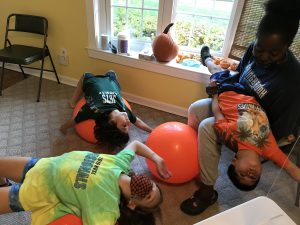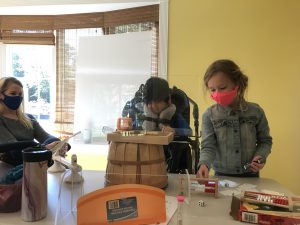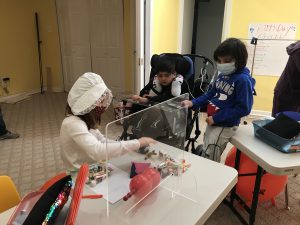 It is November, which means I am thinking about what I am grateful for. This fall I realize that one of my greatest areas of thankfulness is that my own children have been included in the Augmentative Learning Program Study (ALPS) Inclusive Pod hosted by Joey’s Foundation. While I have always been pleased when my children were placed in inclusion classrooms in their elementary school, this feels like a completely different opportunity.
It is November, which means I am thinking about what I am grateful for. This fall I realize that one of my greatest areas of thankfulness is that my own children have been included in the Augmentative Learning Program Study (ALPS) Inclusive Pod hosted by Joey’s Foundation. While I have always been pleased when my children were placed in inclusion classrooms in their elementary school, this feels like a completely different opportunity.
So what is the benefit from this inclusive experience?
I am not sure I can even measure it, or fully put it into words the benefits of my daughters participating in this program.
I see it when watching my daughters spontaneously walk over to Joey and begin working with him on a halloween
project – talking to him as a peer while holding out their two hands, asking him a question, giving him two choices, and waiting for an answer. Because after a few months of being together they totally get how best to chat with him, and understand he has thoughts and opinions to share.
I see it when I am watching them wait patiently (after a few months of learning how to) while he finds his words, or when they change how to stand in order to provide him physical support without giving him the answer.
The benefit is in the opportunity for them to form a friendship – having the time and space to experience reciprocal interactions and reciprocal enjoyment from a friendship. How often in school do we put students in a space together but do not truly provide time for them to connect, interact, share jokes and learn to support each other?

I see the benefit even when I am groaning whenever Joey says “Want to hear a joke?” and my daughter says “YES!” even though she knows she shouldn’t. “Instigator” I glare at her with my teacher-look, and she shrugs because, yeah, she’s with Joey on this one.
This pod has also given them the opportunity to see that those who appear different are human beings, friends, peers, classmates, joke tellers, and worthy of connecting with. I love posing a question “to my first grade students” and watching them all come up with the same answer – whether they could orally say it or not.
I love watching the group design a play around everyone’s individual needs and consider, constantly, how each person will be included. How when we made stone soup they laughed with him and played with the whole vegetables with him – helping find the vegetable word on the eye gaze screen. Or when someone is dysregulated and the room becomes noisy – my noise-sensitive daughter is learning to adjust. Last year she often commented that a boy in her kindergarten class who used an AAC device was always yelling. Now she seems to understand what the “yelling” means. She responds appropriately. It does not interfere with her learning (as I often hear parents or teachers say). It makes her a more empathetic person.
And then she returns the favor. She’s had her own meltdowns or dysregulated moments. Times she’s climbed under a table and I want to die because it’s MY daughter acting like this. Joey looks at her and then at me. Yup. We all have these big feelings. We are all a part of this group, and we all become frustrated sometimes. Every one of us.
 And as far as academics? My daughter who participates in Joey’s guided reading group continues to have the opportunity to learn and grow herself. While I know she can read many of the words the group is working on – she has not yet mastered spelling them. So her job is to spell them and Joey can identify them. Today I asked Joey to select the letters of the word she needed to spell – and he was accurate when she was not. It was such a moment of support as he carefully chose the order of the letters and she realized she needed to rely on him as a peer in order to achieve the answer.
And as far as academics? My daughter who participates in Joey’s guided reading group continues to have the opportunity to learn and grow herself. While I know she can read many of the words the group is working on – she has not yet mastered spelling them. So her job is to spell them and Joey can identify them. Today I asked Joey to select the letters of the word she needed to spell – and he was accurate when she was not. It was such a moment of support as he carefully chose the order of the letters and she realized she needed to rely on him as a peer in order to achieve the answer.
My children have grown academically in this pod – learning about simple machines, writing a play, diving into concepts of community, math, and reading – but more importantly I have watched them grow so much as people. I see it outside of the pod as well, in the questions they ask, the ideas they include in their play, and in how they respond to those around them. I have a whole new appreciation for inclusive learning than I ever did before.
While there are inclusive experiences that ask students to be a buddy or a peer-model, what I find unique about this is that the group itself is not set up around the children with special needs. It is set up so that every child is on equal footing – each child with their own individual learning goals – each child expected to learn and work together – while honoring one another at the same time. It is not a community based on pity or kindness, but on togetherness. I am so grateful my children have had this opportunity.


